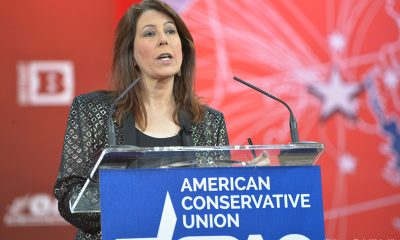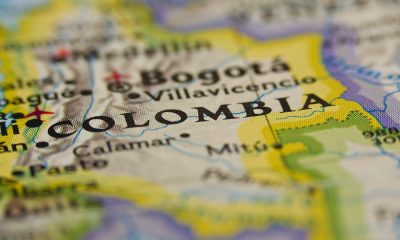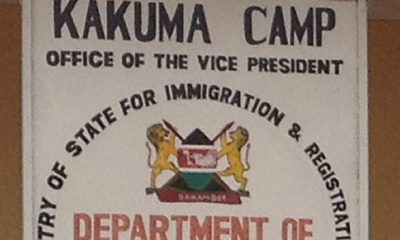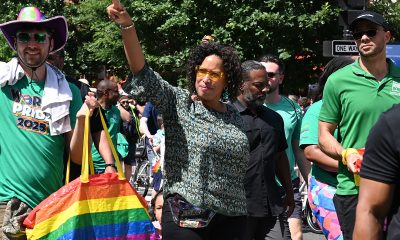The White House
World Bank’s U.S. executive director reaffirms ‘strong commitment’ to LGBTQ, intersex people
Adriana Kugler spoke exclusively with Washington Blade on Feb. 13
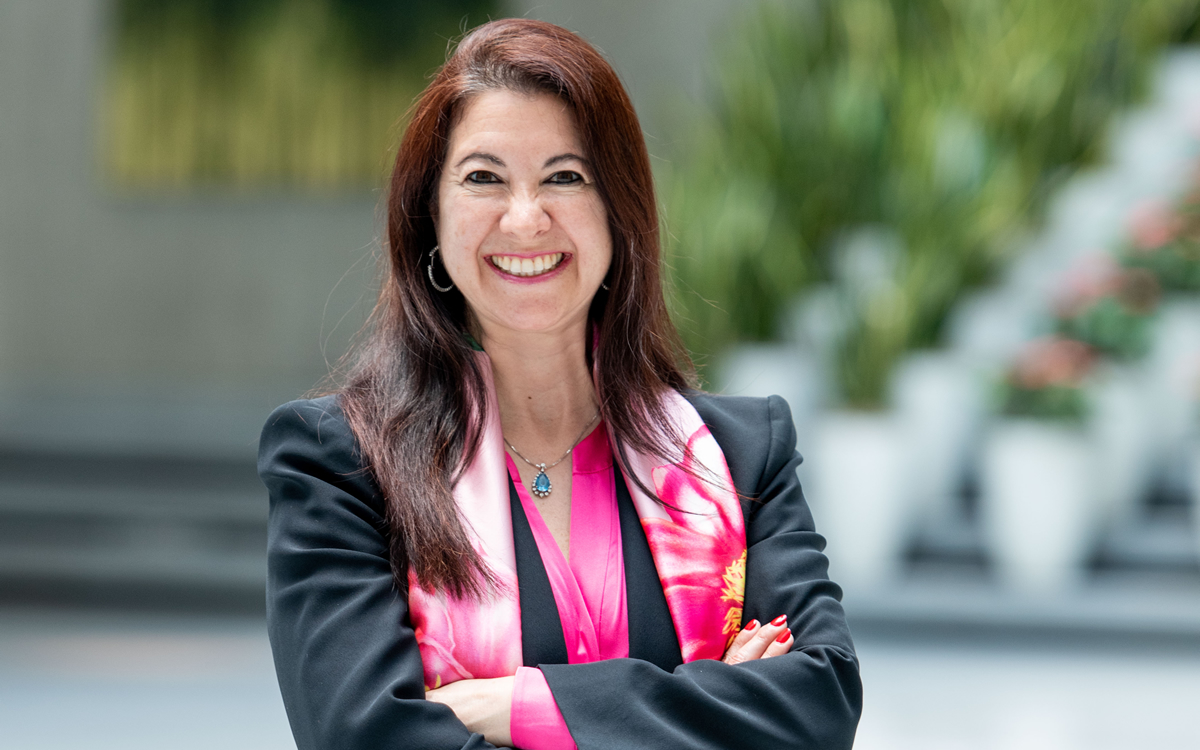
The U.S. executive director of the World Bank Group told the Washington Blade last month during an exclusive interview that she is committed to LGBTQ and intersex rights.
“As U.S. executive director, I certainly have a strong commitment, not only representing the U.S., but myself to advocate for inclusive development to address the needs of LGBTQI persons,” said Adriana Kugler during an interview at her D.C. office on Feb. 13.
Kugler, who was born in Colombia, has been in the position since May 2022. She is the first Latina woman named to the post.
Kugler was chair and chair-elect of the American Statistical Association’s Business and Economics Statistics Section in 2020 and 2019 respectively. She from 2019-2022 was a member of the National Academies of Sciences, Engineering and Medicine’s Board on Science, Technology and Economic Policy and was on the Bureau of Labor Statistics’ Technical Advisory Committee from 2016-2019.
Kugler was a chief economist at the U.S. Labor Department from 2011-2013. She has also been a professor of public policy and economics at Georgetown University since 2010, although she is currently on leave.
2021 presidential memo committed U.S. to promoting LGBTQ, intersex rights abroad
Kugler noted the Biden-Harris administration “have a strong commitment to promote inclusion of LGBTQI+ individuals.”
“This has been a priority,” she said, noting a number of executive orders and memorandums the administration has issued since it took office in 2021. One of them committed the U.S. to promoting LGBTQ and intersex rights abroad as part of the White House’s overall foreign policy.
“That’s been definitely a driving force, understanding that multilateral engagement is really very important in terms of driving protections of LGBTQI persons around the world,” she said.
Kugler told the Blade one of her priorities has been to support the collection and dissemination of data that “can really help to drive support and drive demand for LGBTQ inclusion here at the bank.”
“That’s been one of my priorities, to support data efforts,” she said. “It has been a priority for the U.S. as well, and that has been something that I have put forward very firmly.”
Kugler last November held an “inaugural meeting with management board members and CSOs (civil society organizations) to discuss LGBTQI+ inclusion priorities.” M. V. Lee Badgett, a professor economics at the University of Massachusetts-Amherst who co-directs its Center for Employment Equity, at the gathering presented information that showed the economic benefits of LGBTQ and intersex inclusion.
“That, I think, is a driver that can really help us make the case, just the same way we did it back in the day to drive support for gender equality in the multilateral organizations,” said Kugler. “I really believe in that.”
Kugler added the meeting was held to “restart the conversation, to prioritize inclusion of LGBTQ people and to make sure people understand the economic case for that.”
A specific issue on which Kugler has worked is “making sure that the standards of evidence for misconduct, for cases of misconduct, are coherent with the standards of evidence that we have here in the U.S. and that we have for cases of sexual harassment, as well as for cases of sexual misconduct.”
“That’s the prepondence of the evidence standard, as opposed to the clear and convincing evidence standard that is a very high standard to meet,” said Kugler. “So we’re making sure we work towards making progress so that cases are brought forward by those who suffer from harassment and to make sure that they have a voice and have a chance to make their cases.”
Kugler said another priority “is to engage really closely with colleagues in” GLOBE, a resource group for the World Bank’s LGBTQ and intersex employees. Kugler said a key priority “is to support, especially those LGBTQ staff who work abroad, either in those situations where being LGBTQ is criminalized, or where its a very unfriendly environment, even when it’s not criminalized.”
She told the Blade that it is important to ensure the World Bank “offers protections” for LGBTQ and intersex employees in countries with anti-LGBTQ and anti-intersex rights records. Kugler also said that it is particularly important to offer same-sex spouses and partners the opportunity to access jobs through World Bank offices and local staff in places where they would not be able to work elsewhere and to train local staff on LGBTQ and intersex issues to provide a safe workplace.
An example of an LGBTQ-inclusive project the board recently approved is the World Bank International Finance Corporation’s $275 million loan to Banco Davivienda in Colombia, which provides funding for advisory services to LGBTQ and intersex people and for the design of LGBTQ and intersex banking products.
The World Bank’s EQOSOGI Project has already collected LGBTQ- and intersex-specific data on legal gaps as well as practices that impact LGBTQ and intersex people in 16 countries, and it aims to expand its coverage to more countries in 2024. The EQOSOGI Project is also expanding its research to quantify the economic costs of excluding LGBTQ and intersex people, starting with Serbia and North Macedonia.
“We know the queer community is suffering very adverse consequences there, and it makes sense to have a legal mapping to understand the conditions on the ground that the queer community faces and to make sure that we protect — and at least — recommend anti-discriminatory practices,” said Kugler.

She added she asks questions to her fellow board members “as far as standards and protections for projects in those contexts where the LGBTQI community is criminalized, so that we are sure that those communities have a voice when the bank comes in, if anything goes wrong.”
“We are very strong on that,” said Kugler. “We will continue to support communities and all communities, including the queer community, to be heard if anything goes wrong so that we can make sure that they are widely protected.”
“This will also send a message to these countries that at some point they have to start considering legal changes,” she added. “It starts with raising the issue in front of the rest of the board, all of the world, that these issues of inclusion should be lifted up and they need to be rethinking their legal framework.”
Then-World Bank President Jim Yong Kim in 2014 postponed a $90 million loan to the Ugandan government in response to President Yoweri Museveni’s decision to sign the Anti-Homosexuality Act, which imposed a life sentence upon anyone found guilty of repeated same-sex sexual acts.
The Ugandan Constitutional Court later struck down the “Kill the Gays” law on a technicality, but Kim’s decision to postpone the loan without first consulting the World Bank’s board sparked widespread criticism among board members. Advocacy groups had asked the World Bank not to fund future projects in Uganda, but they did not ask for the cancellation of existing loans.
“We are all very aware of the Uganda case that went wrong,” Kugler told the Blade.
“We’re absolutely firm as part of the World Bank Group’s work and as the U.S. chair that we will protect anybody, to make sure that our projects not only do more good than bad, but that they actually do no harm,” she added. “They shouldn’t be harming communities and they should certainly not be harming LGBTQI communities around the world.”
Kugler acknowledged the World Bank still does not have LGBTQ-specific safeguards, but she added it “is something that is still being discussed.”
The Treasury Department last May endorsed an LGBTQ-specific Asian Development Bank safeguard. The Office of the U.N. High Commissioner for Human Rights is among the organizations that have also backed it.
Chantale Wong, the U.S. director of the Asian Development Bank who is the first openly lesbian American ambassador, last fall told the Blade the Biden-Harris administration continues to push for the Philippines-based ADB to implement the safeguards. Kugler — who described Wong as “an amazing advocate” — noted the World Bank will soon release its new Gender Strategy that will include a nonbinary approach to gender.
“It is helpful when the CSO community engages in these processes, because they help us to lift up these issues with the management of the bank as well,” said Kugler.
“The voices from outside help put pressure … on the countries themselves and how the board proceeds,” she added.
The White House
SPJ calls for take down of Trump’s ‘media offenders’ website
White House launched online database on Monday
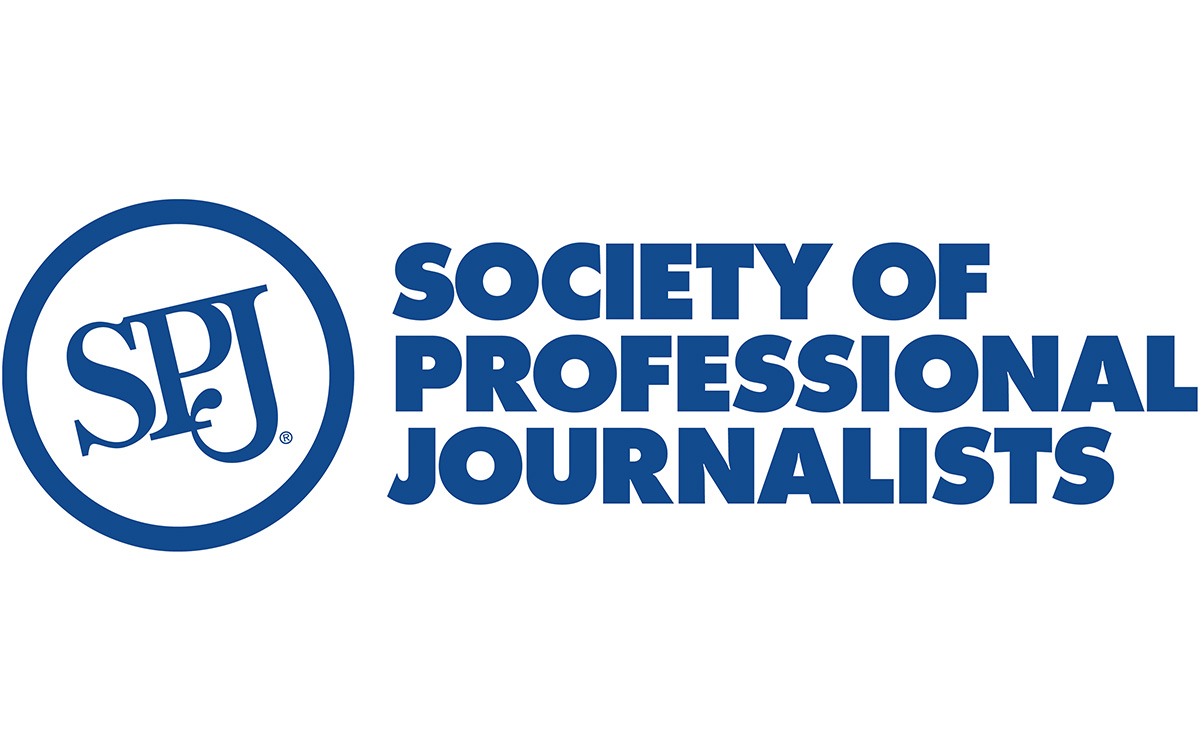
The Society for Professional Journalists has called out the White House for creating a website that targets individual journalists and news outlets that publish unfavorable coverage of the Trump-Vance administration.
In a letter to White House Press Secretary Karoline Leavitt on Monday, the SPJ — the nation’s most broad-based journalism organization, which works to protect the free practice of journalism with high ethical standards — asked the White House to take down its website singling out journalists for negative coverage of the administration.
“Journalists have a constitutionally protected and societally encouraged duty to hold power to account. They are not political opponents to be tracked, cataloged or punished,” the letter signed by SPJ National President Chris Vaccaro and SPJ Ethics Committee Chair Dan Axelrod.
“By publishing reporters’ names, outlets and specific stories, the White House is naming and shaming members of the press in a highly charged political and social environment. SPJ regards this as a form of online harassment that exposes journalists to potential threats and even violence.”
The website currently lists 23 outlets as “Media Offenders of the Week,” singling out national organizations like CBS News, the Boston Globe, and the Independent. The website says these particular organizations “misrepresents and exaggerates President Trump.”
The letter goes on to explain that there are more civil ways to disagree with published stories without singling out people for doing the only constitutionally protected job in the country.
“There are well-established ways of resolving disagreements over the fairness or accuracy of stories. The White House web page attacking so-called ‘media offenders’ ignores these principles and instead denigrates and attacks reporters.”
It also highlights how Trump often attacks women journalists in particular, noting that two weeks ago he told White House correspondent Catherine Lucey from Bloomberg News to be “quiet piggy” after she asked questions related to Trump’s relationship with sex offender Jeffery Epstein on Air Force One.
“Journalists, particularly women, already face an enormous amount of online harassment, and this can convert into physical violence. As you know, women journalists have also been publicly insulted by the president in recent weeks.”
The letter also explains that attacks like this on the legitimate press can cause tensions between journalists who attempt to hold those in power responsible and the public who consumes the rhetoric.
“This page, which categorizes reporting as ‘lies,’ ‘left-wing lunacy,’ and ‘malpractice,’ has a chilling effect on coverage. It undermines the healthy democratic relationship in which journalists hold power to account.”
The letter also draws a connection to how the Russian authoritarian dictatorship references media it dislikes, saying, “The president’s new ‘media offenders’ list mirrors a 2017 initiative by the Kremlin that labeled independent journalism as ‘fake news.’ The United States should not follow that example.”
“SPJ believes civility must be restored between the media and the Administration. Removing this page would be a vital first step toward lowering the temperature and reinforcing America’s commitment to free expression.”
The SPJ’s code of ethics, widely regarded as the ethical standard for good journalism, has four main pillars: Seek Truth and Report It, Minimize Harm, Act Independently, and Be Accountable and Transparent. The code was adopted in 1926 from the American Society of Newspaper Editors and has been revised multiple times since then, including in 1984, 1987, 1996, and most recently in 2014.
NLGJA, the The Association of LGBTQ+ Journalists is the journalist-led association that works within the news media to advance fair and accurate coverage of LGBTQ+ communities and issues, provided a statement to the Blade on the website and supports the SPJ’s public call for removing the website to restore faith in journalistic freedom in the U.S.
“We stand with SPJ in urging the Trump administration to remove its website targeting so-called “media offenders.” While NLGJA believes that media organizations should be held to the highest standards of accuracy and ethical reporting, this website does nothing to support a healthy press environment,” National Board President Ken Miguel told the Blade via email. “Instead, it undermines public trust in the free press, enables the harassment and targeting of journalists, and hinders their ability to cover the news fairly and accurately. Journalists must be able to do their work without fear of government retaliation.”
The White House has not responded to the Washington Blade’s request for comment on the letter.
The White House
‘Lavender Scare 2.0’: inside the White House’s campaign against LGBTQ federal employees
LGBTQ federal workers organization sounding the alarm
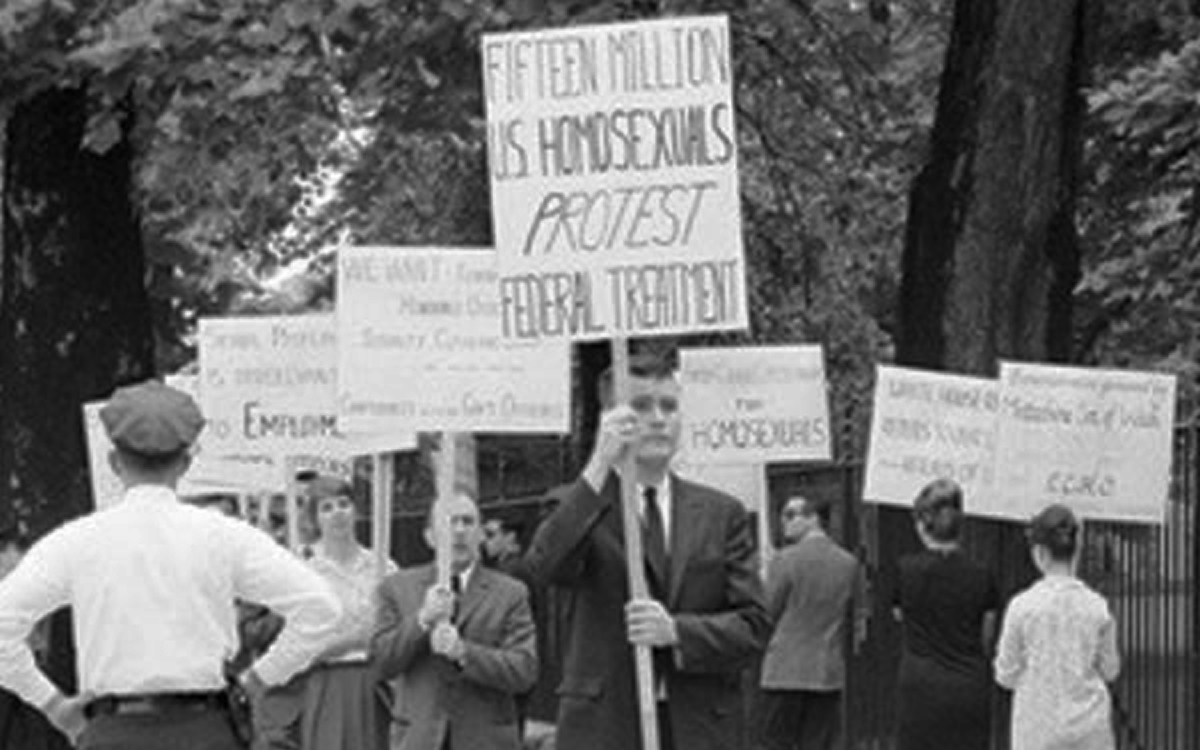
Since the beginning of the modern LGBTQ civil rights movement, there have been small but meaningful shifts in policy and public attitudes over the past 55 years that have allowed many within the LGBTQ community to feel safe in their right to love. The Trump-Vance administration is dramatically eroding that sense of security by enacting policies that directly harm LGBTQ people.
The Lavender Scare 2.0 is here, LGBTQ advocates warn, with stark decisions regarding LGBTQ federal employees that harken back to a time when you could be arrested — or worse— for not being a straight, cis citizen.
The Washington Blade spoke with Lucas F. Schleusener, the co-founder and CEO of Out in National Security, a nonprofit and nonpartisan organization that works to “empower queer national security professionals,” about the change in tone coming from the White House on LGBTQ government employees in national security and other federal circles.
There are almost 2.3 million federal government employees — not including uniformed military personnel, U.S. Postal Services employees, employees of federal contractors, and employees of federal grants — but only 7.3 percent of federal employees identified as LGBQ, and less than one percent identified as transgender, according to the 2023 Federal Employee Viewpoint Survey. Despite these numbers showing that this population is a minority within federal government employees, the steps the Trump-Vance administration is taking to erode LGBTQ federal workers’ protections seem to be of grave importance — especially within the military.
There are many things that caused shifts in public opinion of LGBTQ people (and their rights). Small victories over time build up and can change how the public views a particular issue — from the beginning legal fights for LGBTQ rights, which started nearly a decade before Stonewall by Frank Kameny, to the assassination attempt of the first openly gay public official Harvey Milk, to even the widespread humanizing impact of the HIV/AIDS epidemic on LGBTQ people who have suffered the most from the disease. All help make up the concept of American LGBTQ rights. Trump — laid out by Project 2025 and aided by other conservative politicians — is beginning to erode these rights.
One of the clearest ways the slow erosion of this protective space for LGBTQ federal employees can be seen, Schleusener explained, is through destabilization efforts within the bureaucratic system coming from the Oval Office — and with that is the return of 1980s–90s–style harassment.
“There’s an overwhelming bureaucratic trauma happening — a destabilization that feels intentional,” Schleusener said. “And underneath that, we’re seeing a return of different flavors of workplace harassment across national security agencies, from the CIA to the Import-Export Bank.”
GLIFAA, an employee resource group founded in 1992 that advocates for LGBTQ inclusion, equality, and workplace protections within U.S. foreign affairs agencies, was forced to have its entire board resign to comply with Trump’s “Defending Women from Gender Ideology Extremism and Restoring Biological Truth to the Federal Government” executive order the Blade covered in January, ultimately removing an important social and professional group that supported public servants. Since the executive order, the GLIFAA website has removed most of it’s content and contacts.
Schleusener continued, explaining that this policy will hurt LGBTQ federal workers.
“The administration has dissolved all minority employee resource groups, destroying networks of belonging and leaving queer federal employees in a state of psychological precarity,” he said.
Other organizations that have had to change their approach to supporting LGBTQ federal employee worker rights include the American Federation of Government Employees’ PRIDE program, a subsection of the largest federal employee union representing 820,000 federal and D.C. government workers. AFGE PRIDE was founded in 2015 to get more LGBTQ-inclusive contracts for federal workers and educate all members on LGBTQIA+ workplace and safety issues. AFGE has had numerous public disagreements with both Trump administrations’ anti-LGBTQ policy, notably when the federal employee union criticized the government’s multiple implementations of transgender military bans, and when it called out questionable budget-cutting techniques within the Centers for Disease Control and Prevention and multiple LGBTQ specific organizations by flagging — and subsequently removing — funding for anything with “transgender” in it.
Beyond minimizing the power of official structures created to specifically protect workers’ rights, the current administration and some members of the Republican Party have started to use “digital witch-hunts,” using social media to harass, dox, and lie about LGBTQ federal employees. While not as bad as denying a job to a deserving candidate for past homosexual “proclivities” like what happened with Frank Kameny, there are consequences to this shift in what is deemed acceptable for the online appearances of LGBTQ federal workers inside and outside of federal buildings.
“It’s not clearances being denied so much as it is targeted harassment. Laura Loomer has essentially declared herself the new Joe McCarthy, going through the Plum Book to identify anyone with ‘LGBT,’ ‘DEI,’ ‘equity,’ or ‘trans’ in their job titles and doxxing them.”
This intolerance promoted by the Trump-Vance administration and his party is not like whistleblowing on a State Department official for selling secrets to foreign governments, Schleusener explained, but rather attacking a part of LGBTQ federal workers’ human identity.
“These are ordinary federal workers — not public figures — whose home addresses end up on the internet simply for doing their jobs.”
Recently Laura Loomer, the far-right political activist, conspiracy theorist, internet personality, and Trump confidante, accused the trans community of playing some role in the assassination of right-wing political pundit Charlie Kirk, even going as far as to say that transgender people are “a national security threat” and constitute a terrorist movement, despite the shooter not being trans.
Trans federal employees have been facing a particularly difficult time under Trump’s second presidency. From bathroom bans restricting what gender bathrooms people can use to harassment on behalf of the federal government to remove them from military positions, there is a hyper-critical lens being placed on trans federal workers.
“There’s an organization called STARRS that combs through Instagram and LinkedIn looking for minority service members who show any pride in their identity. If you’re LGBTQ, a person of color, or even an ally who took your kids to Pride, they will tag and harass you — and they have a direct line into the Pentagon,” Schleusener pointed out. “People have been removed from their posts because of this, including the Navy’s top West Coast endocrinologist, whose only ‘offense’ was having a rainbow banner and pronouns on LinkedIn.”
Commander Janelle Marra was the medical director of Expeditionary Medical Facility 150 Bravo in San Diego until the TikTok account “Libs of TikTok” posted about her role as the Navy deputy medical director for trans healthcare, which was listed on her LinkedIn page, leading Defense Secretary Pete Hegseth to publicly order her removal from the role.
In addition to formally using the government to be hostile — if not outright discriminatory — against LGBTQ federal employees, the Trump-Vance administration has also fostered more informal harassment directed toward LGBTQ federal employees.
“It’s a climate of fear without any logical pattern — people doing important, everyday work suddenly find themselves targeted. These are not public political actors; they’re regular federal employees who now have to manage LinkedIn as if they were cabinet officials,” the former Pentagon employee and Obama national security associate shared.
“Between the administration’s formal hostility and these informal digital witch-hunts, queer employees are being squeezed from every direction.”
While there are some very clear discriminatory policies being put out by the White House, there is clear pushback from LGBTQ, human rights, and democracy advocates to stop them within the courts. With such a high amount of discriminatory action being taken by the Trump-Vance administration, it leaves the possibility for “legal chaos” within an already unhelpful system and the risk of a bad U.S. Supreme Court precedent.
“A lot of what we’re dealing with legally is documenting enough harassment to file viable claims, but the system is stacked against us. Even when we find a legal path — like restoring pensions for trans service members whose retirement benefits were revoked — everything is designed to be slow, difficult, and demoralizing,” Schleusener said. “And the frightening question is always whether fighting back could result in a bad Supreme Court precedent that hurts queer workers nationally.”
These pointed actions taken to harm LGBTQ federal worker protections by Trump and his followers in the federal system warrant a declaration of a second Lavender Scare, Schleusener told the Blade.
“Yes — this absolutely constitutes a second Lavender Scare. The federal government is saying trans people don’t belong in the military, even after spending billions training them for an all-volunteer force, which is both dangerous and absurd. Combined with attacks on ERGs, human rights reporting, and attempts to purge queer employees, it mirrors the patterns of the Cold War era.”
But this isn’t your grandparents’ Lavender Scare with vice squad cops trying to catch federal employees cruising like in the 60s. This is a whole other beast, Schleusener said.
The escalation of offenses, particularly for trans women within the government, is a major concern. The distaste for the trans community within the White House and among the president’s supporters on Capitol Hill makes this worse than a fine or a night in jail. The attempts to expand laws and policy regarding gender identity — particularly related to the National Defense Authorization Act and passport approvals — could have lasting impacts on LGBTQ federal workers’ ability to live in the U.S.
“This Lavender Scare is escalating: the NDAA moving through Congress includes a ban on trans women at service academies, and the administration is using Cold War statutes like the Walter McCarran Act to bar trans foreign nationals from entering the country.
Every opportunity they’ve had to go further, they have taken — and there’s no indication they plan to stop at trans people.”
Schleusener explained that although they are different in implementation, this new Lavender Scare is taking just as much of a toll on LGBTQ federal workers as it did the first time around — most of whom just want to help make the U.S. a better place.
“Like the original Lavender Scare, this is a manufactured moral panic weaponized through bureaucracy. Back then, the State Department bragged about driving queer employees to suicide; now we’re seeing trans service members taking their lives under the pressure of these policies. The difference today is that social media makes the harassment instantaneous and far-reaching, even as queer visibility also makes it harder to shove an entire community back into the closet.”
He also pointed out the growing purges of women and people of color from federal roles alongside the targeting of queer federal employees. This is a time to be aware of how federal work policies could shift the culture — and the safety of some of the most disenfranchised citizens.
“This isn’t only about LGBTQ people — there’s a broader purge underway targeting women and people of color in the senior ranks of the military. The first woman to take command of the SEALs was pushed out purely because she was a woman.
It’s a coordinated effort to turn back the clock across multiple identities simultaneously,” Schleusener said.
This manufactured climate of fear for LGBTQ federal employees is causing some to hide, delete, or exit the federal workforce altogether.
“We’ve seen a huge uptick in people trying to scrub their names from websites, delete their public bios, or step back from leadership programs out of fear of being hunted by Laura Loomer or similar groups. Even something as basic as using the bathroom has become a fraught question because the Pentagon now requires people to use facilities based on sex assigned at birth,” Schleusener added. “It’s driving people out of public service early, especially those with skills that are highly valued in the private sector.”
The Blade attempted to speak to multiple LGBTQ federal workers on record about their experience in seeing an overall shift in policy and tone directed toward the LGBTQ community — either anonymously or with their name attached — but no one wanted to speak for fear of losing their job. The Blade also reached out to the White House Press Office but has not received a response to the request for a statement on these allegations.
The White House
White House halts World AIDS Day recognition amid HIV funding cuts
Trump-Vance administration under increased criticism over policies
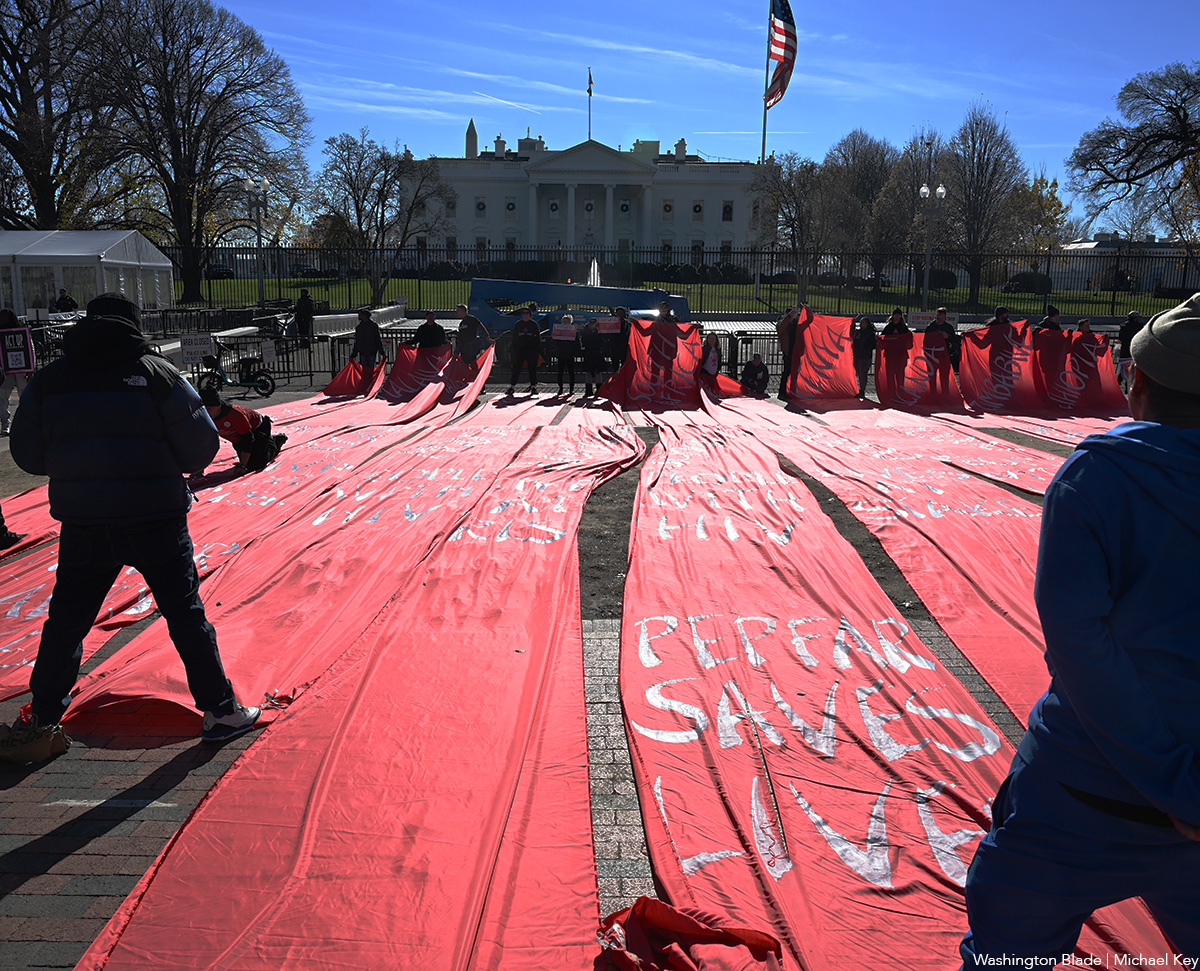
For the first time since the global observance began, the U.S. government did not commemorate World AIDS Day on Monday.
World AIDS Day, first marked in 1988, has long served as an annual reminder of the ongoing effort to end an epidemic that has killed more than 44.1 million people worldwide and continues to disproportionately impact LGBTQ people, communities of color, and those in the American South. Yet the Trump-Vance administration declined to acknowledge the day this year, severing a symbolic but consistent tradition upheld by every president since Ronald Reagan.
The move comes despite the scale of the epidemic today. Approximately 1.2 million people in the U.S. are living with HIV, according to federal estimates, and about 13 percent — 158,249 people — do not know their status. Globally, the World Health Organization reports 40.8 million people were living with HIV at the end of 2024.
Presidents of both parties have historically used World AIDS Day to highlight progress, remember lives lost, and recommit to reducing disparities in prevention and treatment. Past administrations have also commemorated the day through displays of the AIDS Memorial Quilt — first created in 1987 and later spread across the National Mall and White House lawn. Today, the quilt includes the names of more than 94,000 people lost to AIDS on more than 47,000 panels.

This year’s silence from the White House follows several sweeping foreign aid rollbacks instituted by President Donald Trump after his 2025 inauguration. According to an October report by KFF, the administration enacted a “90-day review of foreign aid; a subsequent ‘stop-work order’ that froze all payments and services for work already underway; the dissolution of USAID, including the reduction of most staff and contractors; and the cancellation of most foreign assistance awards.”
These cuts have created significant funding gaps for nongovernmental organizations around the world — many of which work directly to prevent HIV transmission and expand access to lifesaving treatment.
The State Department dismissed criticism of the administration’s decision not to acknowledge World AIDS Day.
“An awareness day is not a strategy. Under the leadership of President Trump, the State Department is working directly with foreign governments to save lives and increase their responsibility and burden sharing,” deputy spokesperson Tommy Pigott said in a statement CNN first reported. “Earlier this year, we released a global health strategy aimed at streamlining America’s foreign assistance and modernizing our approach to countering infectious diseases.”
The U.S. historically played a central role in the global HIV response. Since 2003, the United States has been the largest financial supporter of HIV/AIDS programs — primarily through President George W. Bush’s PEPFAR initiative, which has invested more than $110 billion into the fight to end the epidemic.
Despite overall declines in transmission, HIV continues to disproportionately affect racial and ethnic minorities, LGBTQ people, and men who have sex with men. More than half of new HIV diagnoses occur in the South.
The Centers for Disease Control and Prevention’s Ending the HIV Epidemic in the U.S. initiative focuses on the 48 counties, D.C., San Juan, Puerto Rico, and seven rural states that accounted for more than half of all new diagnoses in 2016 and 2017.
Advocates say the administration’s withdrawal from World AIDS Day — combined with its cuts to foreign and domestic health programs — risks reversing hard-won gains.
“Though new HIV infections declined 12 percent from 2018 to 2022, progress is uneven with Black people accounting for 38 percent of new diagnoses, Latino people accounting for 32 percent of new diagnoses and more than half (52 percent) of new HIV diagnoses were among people living in the South,” Jarred Keller, senior press secretary at the Human Rights Campaign, told the Washington Blade via email. “Cuts to CDC funding have driven HIV prevention resources to historic lows, stripping support from HIV-focused programs.”
Legal and public health experts echoed that concern, saying that there is a possibility to stop HIV/AIDS, but only if efforts are taken gradually over time.
“HIV is a preventable and treatable condition, but only if the research, organization, and effort continue to be a priority to those looking out for the health of Americans and people worldwide,” said Lambda Legal HIV Project Director Jose Abrigo.
-

 The White House4 days ago
The White House4 days ago‘Lavender Scare 2.0’: inside the White House’s campaign against LGBTQ federal employees
-

 a&e features3 days ago
a&e features3 days agoMeet Mr. Christmas
-

 District of Columbia4 days ago
District of Columbia4 days agoActivists praise Mayor Bowser’s impact on city, LGBTQ community
-

 Japan5 days ago
Japan5 days agoTokyo court upholds Japan’s same-sex marriage ban

